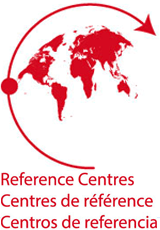- home
- trade topics
- trta
- reference centres
TRTA: REFERENCE CENTRES PROGRAMME
Reference Centres Programme
The general objective of the WTO Reference Centre Programme is to enable government officials, private sector and academic institutions, and the general public in beneficiary countries to access and utilize trade-related, information-technology resources made available by the WTO with a view to raising awareness and disseminating information on WTO matters among national stakeholders. To this end, the WTO provides training (especially to RC managers) on the use of its databases, document search facilities and IT resources. Within budgetary possibilities the WTO also donates to Least-Developed Countries the necessary equipment for the operation of the Reference Centres. There are currently over 100 active Reference Centres around the world.
Contact: For any additional information on the Reference Centres Programme, please contact the ITTC at: [email protected]
News back to top
Background
More than being Centres where trade-related research is facilitated and supported, the Reference Centres organize and coordinate training activities, and subject to space capacity, host technical meetings and other trade-related events. Furthermore, Reference Centres also aim at enhancing their training role by contributing to the participation of trade officials and university lecturers in the WTO eLearning courses (WTO ECAMPUS) as an effective means of preparing participants prior to face-to-face training. More
back to top
A revised approach
While the Reference Centre provides a physical WTO presence in the country, the number of Centres have become increasingly difficult to manage. Also, with the rapid evolution in technological developments and innovations, the requirements related to maintaining, servicing and updating the equipment, are become increasingly challenging. In addition, there continues to be demand for the establishment of new RCs, challenging human resource constraints of the Secretariat.
A new strategy regarding the installation and operation of RCs and the overall functioning of the programme will focus on a targeted group of beneficiary countries, namely those which submitted their 2013 Annual Report of Activities. More
back to top
Reporting
Starting in 2015, Reference Centres will be requested to submit two semi-annual reports instead of one annual report. The reporting template has been simplified to facilitate this. The RC programme is implemented and monitored on the basis of objectives and indicators established in the WTO Technical Assistance and Training Plan following a results-based-management approach (RBM). This requires Reference Centres to operate and report on indicators, as described in the table.
back to top
Equipment and software
RCs in LDCs are provided with state-of-the-art IT equipment (PCs, printers, a photocopier, scanners), as well as books, CDs, DVDs and relevant WTO related documentation. Reference Centres have access to WTO databases, publications and training materials on WTO Agreements. The equipment is financed by the Doha Development Agenda Global Trust Fund (DDAGTF) for LDCs. Normally, a RC will be equipped with three computers. Full access to WTO official databases, e.g. the Integrated Database (IDB), the Consolidated Tariff Schedules database (CTS), and “Documents online”, taking into account policy rules on what is accessible to WTO members and to acceding countries.
The managers of the RCs will be appropriately trained on the use of software to retrieve the required data and information for dissemination and training purposes. This may include training on software used and provided by other agencies (ITC, UNCTAD, World Bank). It is important that beneficiary institutions provide training and guidance to RC managers in respect of the management of the Reference Centres.
Overall, the RC programme will seek to cover 25 countries between 2015 and 2016. Priority will be given to LDCs, primarily, but pending requests from developing countries will be dealt with during 2015. Subsequently, the RC programme will seek to incorporate the remaining LDCs which either do not have a WTO Reference Centre or that have a RC that has not been upgraded in 10 years or more.
Countries that did not submit the 2013 reports are invited to submit their reports in order to activate possible WTO support as described on this page.
In 2014, nine WTO Reference Centres were established or upgraded, while a few missions to launch Reference Centres were postponed for implementation in 2015. Three RCs were established in Africa (Burundi, Swaziland and Mali), three in Asia-Pacific (Comoros, Papua New Guinea and Solomon Islands), one in the Caribbean (St Vincent and the Grenadines), and one in Latin America (Costa Rica).
